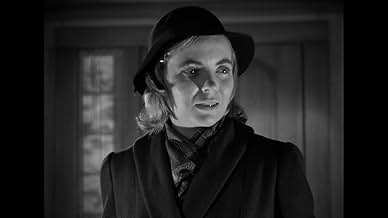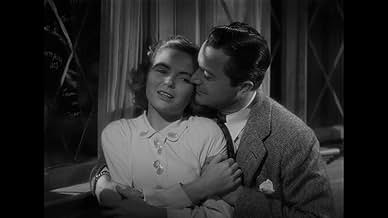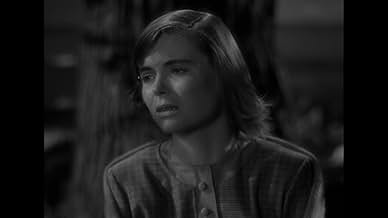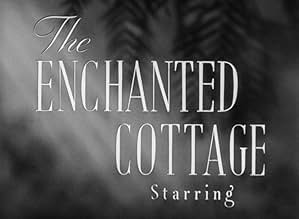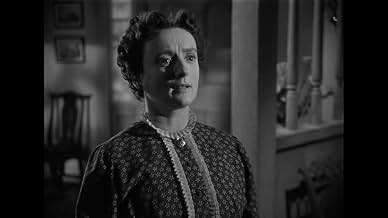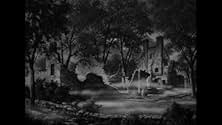IMDb रेटिंग
7.5/10
3.7 हज़ार
आपकी रेटिंग
अपनी भाषा में प्लॉट जोड़ेंA plain maid and a wounded war veteran are transformed by their love for each other while residing in an enchanted honeymoon cottage.A plain maid and a wounded war veteran are transformed by their love for each other while residing in an enchanted honeymoon cottage.A plain maid and a wounded war veteran are transformed by their love for each other while residing in an enchanted honeymoon cottage.
- निर्देशक
- लेखक
- स्टार
- 1 ऑस्कर के लिए नामांकित
- 3 जीत और कुल 1 नामांकन
Wally Albright
- Soldier at dance
- (बिना क्रेडिट के)
Virginia Belmont
- Bit Role
- (बिना क्रेडिट के)
Barbara Blair
- Mildred
- (बिना क्रेडिट के)
Patti Brill
- Bit Role
- (बिना क्रेडिट के)
Martha Holliday
- Bit Role
- (बिना क्रेडिट के)
Nancy Marlow
- Bit Role
- (बिना क्रेडिट के)
Sherman Sanders
- Dance Caller
- (बिना क्रेडिट के)
फ़ीचर्ड समीक्षाएं
"The Enchanted Cottage" appeared during a decade marked by World War II, the advent of the rough reality of film noir, the increased use of Technicolor to enhance box office appeal and the decline of the film studios accompanied by the rise of television. In this period of great change appeared some of the most endearing black and white romantic fantasies ever produced by Hollywood. Why? Perhaps these films were meant to take us back to a better place, where decency, honor, love and sincerity influenced our behavior much more profoundly than they do today.
During the 1940s, we were enthralled by the beauty of such classic romantic fantasies as "Random Harvest", "Ghost and Mrs. Muir," "Tomorrow is Forever," "Here Comes Mr. Jordan," "Sentimental Journey," and "The Enchanted Cottage." Was it coincidence that during a time of such instability and stress, many of us sought out the almost magical effect of these stories of hope and redemption? Occasionally a small later film-----like "Marty"-----would explore themes somewhat similar to those posed in "The Enchanted Cottage" about how beauty is in the eye of the beholder-----and that possessing a good character and a sensitive soul were much more valuable than the attractive looks that often produce superficial and transitory relationships between people.
"The Enchanted Cottage" seems to cast a spell upon its viewers-----as many of these postings reveal. Apparently its story of the purity of true love is timeless.
And to the poster who ventured the opinion that "The Enchanted Cottage" surpassed "Random Harvest" as a romantic fantasy, let me venture a gentle disagreement. In any event, seek out all of these great films of the 1940s and be transported to a time when being sentimental was not a sin and believing in the power of romance was not an embarrassment.
During the 1940s, we were enthralled by the beauty of such classic romantic fantasies as "Random Harvest", "Ghost and Mrs. Muir," "Tomorrow is Forever," "Here Comes Mr. Jordan," "Sentimental Journey," and "The Enchanted Cottage." Was it coincidence that during a time of such instability and stress, many of us sought out the almost magical effect of these stories of hope and redemption? Occasionally a small later film-----like "Marty"-----would explore themes somewhat similar to those posed in "The Enchanted Cottage" about how beauty is in the eye of the beholder-----and that possessing a good character and a sensitive soul were much more valuable than the attractive looks that often produce superficial and transitory relationships between people.
"The Enchanted Cottage" seems to cast a spell upon its viewers-----as many of these postings reveal. Apparently its story of the purity of true love is timeless.
And to the poster who ventured the opinion that "The Enchanted Cottage" surpassed "Random Harvest" as a romantic fantasy, let me venture a gentle disagreement. In any event, seek out all of these great films of the 1940s and be transported to a time when being sentimental was not a sin and believing in the power of romance was not an embarrassment.
My wife and I love this movie. There is an ugly duckling in all of us but the right person can bring out the swan. This movie brings that out so well. I am my wife's prince charming and she is my Princess. This movie helps us remember that after 15 years of marriage. In the movie we are taken away from our everyday lives to a quiet mysterious cottage. Couples have visited the cottage for hundreds of years, and gone away mysteriously changed and in love. The film creates a strange atmosphere that takes you into the thoughts and feelings of two lonely people. We then witness their magical transformation into happy beautiful people. No matter how hard the outside world tries to take that happiness away from this happy couple, the cottage protects their romance.
When I was a little boy, my mother used to say that "The Enchanted Cottage" was her favorite movie. It was a long time before I ever saw it.
This is a lovely little film. Herbert Marshall does his usual good job playing someone impaired in some way but with a great deal of emotional fortitude. Mildred Natwick, cast a bit against type (she was a lovely comedienne) as the landlady, a dour WWI widow, ends up being sweet.
This is one of Robert Young's best performances, and I think that he is often underrated. He was something of an insecure man, and he projects his humanity so well in this and in many other films of the 1940's; of course, I'd gladly buy insurance from Jim Anderson, too!
What really strikes me about this film, though, is that the Young character, returning from the war, finds himself to be disfigured, and "Laura Pennington" believes herself to be ugly and unattractive. One of the things that has often struck me about people is how little their actual physical beauty affects how they perceive themselves, and how that influences their behavior.
Could it be that Robert Young's scar and Dorothy Malone's plainness are more in their minds than on their faces? Could it be that love can transform not only the plain so that they believe that they are beautiful, but also that it can transform the beautiful so that they can see that quality in themselves? The reason that this film works--and it works wonderfully well--is that it appeals to every person who has ever felt inadequate, and that there are very few people (and let's face it, those very few are probably sociopaths) who don't feel inadequate.
Pinero, the playwright of the original, understood this all to well, but it has never been a popular way of looking at things: in a way, this film is a "revenge of the nerds," which says (as does the nerd film) that beauty is, truly, in the eye of the beholder.
Really nice acting on the part of all concerned, including the wonderful Spring Byington. We don't have Hollywood actors like Byington and Marshall anymore, those wonderful character actors whose presence in a movie was part of the tissue that held it together, and connected it with other films. Lubitsch, Sturges, Capra, RKO, Warner Bros, and even MGM had a stable of these actors whose presence illuminated their work and expanded on it. Someday I will make a list of them and dilate on this subject further. This is a little gem that needs to be seen more often.
This is a lovely little film. Herbert Marshall does his usual good job playing someone impaired in some way but with a great deal of emotional fortitude. Mildred Natwick, cast a bit against type (she was a lovely comedienne) as the landlady, a dour WWI widow, ends up being sweet.
This is one of Robert Young's best performances, and I think that he is often underrated. He was something of an insecure man, and he projects his humanity so well in this and in many other films of the 1940's; of course, I'd gladly buy insurance from Jim Anderson, too!
What really strikes me about this film, though, is that the Young character, returning from the war, finds himself to be disfigured, and "Laura Pennington" believes herself to be ugly and unattractive. One of the things that has often struck me about people is how little their actual physical beauty affects how they perceive themselves, and how that influences their behavior.
Could it be that Robert Young's scar and Dorothy Malone's plainness are more in their minds than on their faces? Could it be that love can transform not only the plain so that they believe that they are beautiful, but also that it can transform the beautiful so that they can see that quality in themselves? The reason that this film works--and it works wonderfully well--is that it appeals to every person who has ever felt inadequate, and that there are very few people (and let's face it, those very few are probably sociopaths) who don't feel inadequate.
Pinero, the playwright of the original, understood this all to well, but it has never been a popular way of looking at things: in a way, this film is a "revenge of the nerds," which says (as does the nerd film) that beauty is, truly, in the eye of the beholder.
Really nice acting on the part of all concerned, including the wonderful Spring Byington. We don't have Hollywood actors like Byington and Marshall anymore, those wonderful character actors whose presence in a movie was part of the tissue that held it together, and connected it with other films. Lubitsch, Sturges, Capra, RKO, Warner Bros, and even MGM had a stable of these actors whose presence illuminated their work and expanded on it. Someday I will make a list of them and dilate on this subject further. This is a little gem that needs to be seen more often.
This is a forgotten gem of a movie that I have only seen two or three times over the years but it's a well made romance/drama/fantasy film that deserves a look. A WWII casualty played by Robert Young was to be married and honeymoon in a New England historic quaint honeymoon cottage before the war and fate stepped in. Instead he returns from the war with disfiguring and disabling injuries bitter and resentful and as he takes refuge in the cottage he was to have honeymooned in he meets a housekeeper who is plain in appearance and self doubting in confidence and appears resigned to an unmarried life. They marry at first out of convenience and then the magic of the centuries cottage ignites in them the beauty of the soul. Noted British playwright Sir Arthur Wing Pinero wrote the play The Enchanted Cottage: A Fable in Three Acts as a moral booster to WWI veterans resuming life after the Great War with many disabled and disfigured. It was first staged in London in 1921 and then in America on Broadway in the spring of 1923. The stage play was quite different from the two filmed versions in it showed the stories of three couples who honeymooned in the cottage set in England over the years. It also had witches and cherubs and imps. Four roles from the play made the transition to the film Laura Pennington, Oliver Bashforth (with a slight change to Bradford), Major John Hillgrove and Mrs. Minnett. Hollywood filmed a silent film version in 1924 with a script adapted by Gertrude Chase and Josephine Lovett that eliminated the overt supernatural characters and other wedding couples so it centered more on the four main characters. For the 1945 film Screenwriters Dewitt Bodeen and Herman J. Maniewicz do a rewrite of the 1924 adaptation with John Cromwell directing. Cromwell had made such films as The Prisoner of Zenda, Little Lord Fauntleroy, Of Human bondage, Abe Lincoln in Illinois and So Ends Our Night among many in his fine directorial career. Proliffic cinematographer Ted Tetzlaff who photographed such films as Talk of the Town, I Married a Witch and Notorious is the the film's cinematographer. Robert Young and Dorothy McGuire star along with fine performances by Herbert Marshall, Mildred Natwick and Spring Byington. This is a fine film and is indeed enchanting. I would give this a 9.0 out of 10.
This movie moved me the first time I saw it, I was 7 years old. I didn't really understand the plot, but I knew it made me feel so happy inside. Now that 30 have passed, I can see the beauty in this story of love and enchantment. It brings hope to anyone that feels they will never find that special someone. For those of us that have found that special someone, then when you watch this movie, you can be reminded that though there are trying times in every relationship, you can always find that one thing that made you fall in love to begin with.
क्या आपको पता है
- ट्रिवियाIn 1973, it was announced that a remake would be made. According to Robert Young, the setting would be updated and Dorothy McGuire and he would be playing the parts of the housekeeper and blind pianist originally played by Mildred Natwick and Herbert Marshall. The idea fell through after McGuire watched a screening of the original at Young's invitation at the actor's home. She said that the film belonged to another period and that she did not want to go backward.
- गूफ़As Mr. Bradford is leading Major Hillgrove to the beach, there is a dog swimming in the ocean as Laura chats with Danny. The dog brings the stick to be thrown back into the water, and he is completely dry.
- भाव
Laura Pennington: Oliver, we've never written our names - somehow I think they'd want us to.
- क्रेज़ी क्रेडिटIn the opening credits, the principle actors are seen with their names superimposed over the shots. Dorothy McGuire is seen in her character's beautiful and then unattractive state; Robert Young is seen only in his normal, attractive state. This is interesting in that the story deals with both characters, not one, falling in love and seeing only one another's beauty, despite both of their unfortunate appearances.
- इसके अलावा अन्य वर्जनAlso shown in computer colorized version.
- कनेक्शनFeatured in TCM Guest Programmer: Whoopi Goldberg (2007)
टॉप पसंद
रेटिंग देने के लिए साइन-इन करें और वैयक्तिकृत सुझावों के लिए वॉचलिस्ट करें
विवरण
- चलने की अवधि
- 1 घं 31 मि(91 min)
- रंग
- पक्ष अनुपात
- 1.37 : 1
इस पेज में योगदान दें
किसी बदलाव का सुझाव दें या अनुपलब्ध कॉन्टेंट जोड़ें


